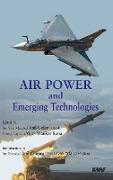Air Power and Emerging Technologies
BücherAngebote / Angebote:
Emerging technologies will irrevocably transform the battlefield of the future. This book aims to provide an overview of futuristic and emerging technologies in the aerospace domain.
Future conflicts will almost certainly entail multi domain operations with air power being an inalienable part of it. With the development of modern aircraft and weapon systems revolutionary changes have taken place, which would have a significant impact on war waging capabilities in the aerospace domain. Artificial intelligence, coupled with compatible hardware, networked sensors and modern made weapon systems have increased the lethality and accuracy of aerial attacks. While technology has facilitated networked sensors in enabling real time decision making, they remain susceptible to cross domain cyber attacks. The impact of technology would require innovative operational concepts to fight future wars. The air warriors of today would need to be educated, trained and equipped to retain the cutting edge in the employment of air power as an important tool of statecraft.
This book makes an effort to look at the existing technologies in the aerospace domain and crystal gaze into the future. The effect of space technologies, electronic warfare, modern weapon systems including hypersonic missiles, employment of manned and unmanned systems in autonomous and Manned Unmanned Teaming mode would define the future of aerial warfare in general and give a sense as to how the IAF should be looking at certain key aspects of air power that would be relevant for us in the future.
Air Vice Marshal Anil Golani (Retd) was commissioned in the Flying Branch of the IAF in December 1982 and superannuated in November 2019, with varied experience having served across the country and abroad.
Group Captain Vijay Shankar Rana, Senior Fellow, Centre for Air Power Studies. Group Captain Rana was commissioned in the fighter stream of Indian Air Force on 13 June 1992.
Folgt in ca. 15 Arbeitstagen
